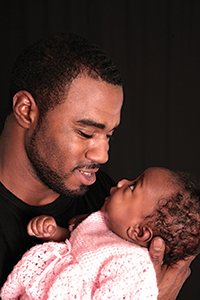
INFANCY
New Life, New Routines
 Congratulations! Whether you are pregnant, a new parent, or you have children and are expecting a new baby, it is an exciting time. Your family is preparing for or getting to know the baby. New parents have many concerns, from recovery from pregnancy and birth to how to care for this baby. Each parent may have questions about their new roles.
Congratulations! Whether you are pregnant, a new parent, or you have children and are expecting a new baby, it is an exciting time. Your family is preparing for or getting to know the baby. New parents have many concerns, from recovery from pregnancy and birth to how to care for this baby. Each parent may have questions about their new roles.
You may wonder “is this typical for newborns?” Each child is unique. You’ll learn what makes this baby happy or sad. You’ll learn a new “language”—your baby’s ways of communicating—the difference between “I’m hungry!” and “I need you!” You will learn to recognize those needs even before crying begins.
Your baby is learning who to trust and count on for his needs. And he’s getting to know the rest of the family, too.
Building a New Partnership
This is a chance to build a partnership between you, your child, and your health care provider. You and your health care professional will want to get to know each other so you can work well together.
Your health care provider is the expert for lots of your questions, but this is only half of it. You—and later, your child—are the other half. You know your child and family better than anybody else. Parents count on receiving information at health care visits—and this is important. Parents can give information, too, about your family, your community, and what it has to offer that can help other families as well.
Parenting is a big job that is easier when you don’t “go it alone.” Think about people who can give you support when you need it. It might be your spouse or partner, other family members, other parents, community groups, your health care provider, or your child care provider. Lean on your support network when you need to.
If you have questions about your baby’s development, talk with your child’s health care provider or others who know your child well. Babies develop at different rates and in different ways, so what you are worried about may turn out to be nothing after all. On the other hand, you may be the first to notice something is not quite right. Put fears to rest and seek help. Ask your health provider. Make use of the many, many resources that exist.